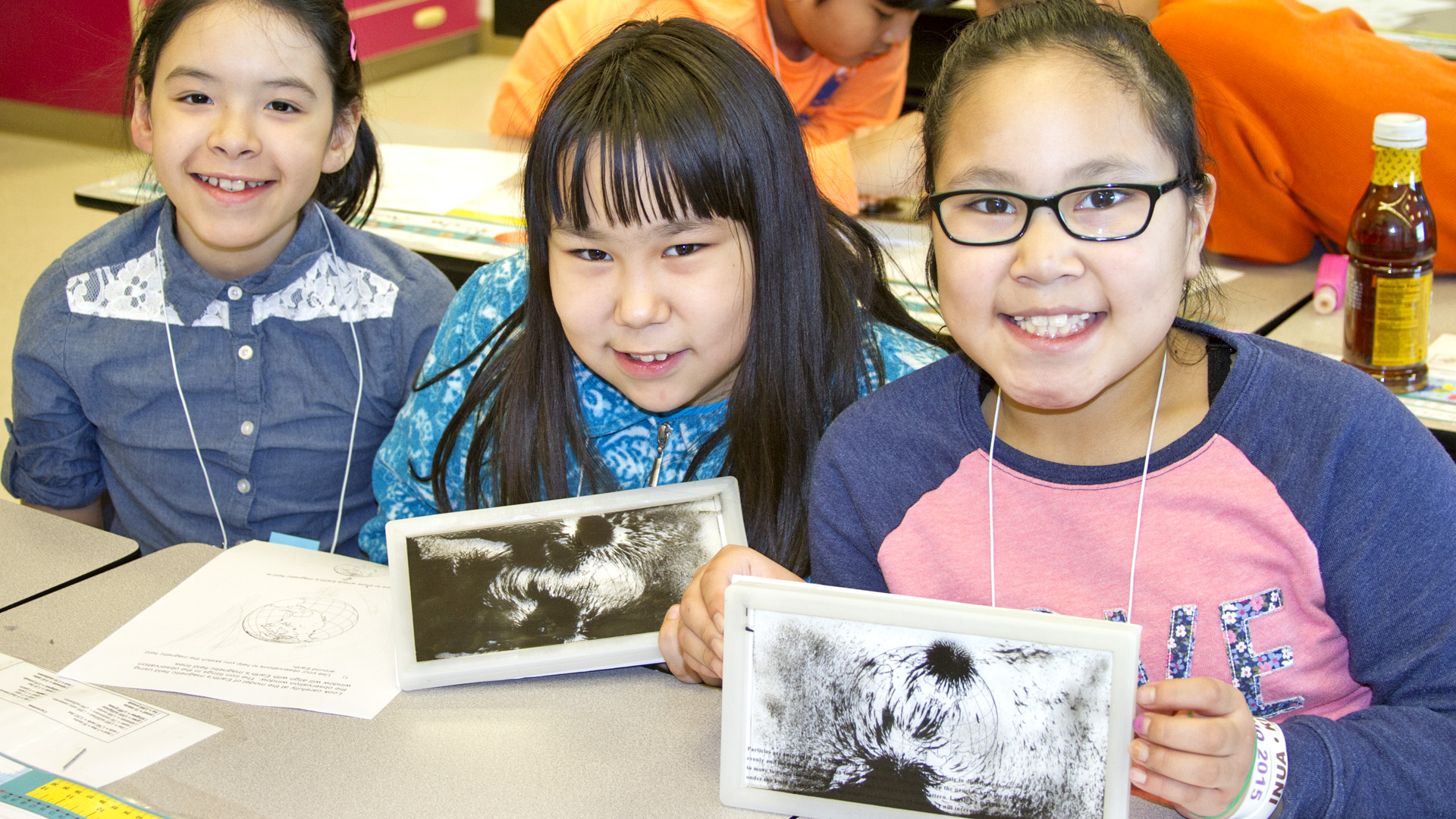
Education and outreach are services the Geophysical Institute provides to deliver cutting-edge, current research to the public. Our programs are designed to make science accessible, welcoming, and engaging to science learners of all ages. Check out our outdoor, online and virtual programs and our K-12, Alaska-based curricula using the links below.
604 Elvey Building
Monday–Friday, 8 a.m.–5 p.m.
uaf-gi-outreach@alaska.edu
https://outreach.gi.alaska.edu
Interactive programs:
- Science for Alaska: Free public talks and events
Science for Alaska is an annual series of free, public science talks and year round community events. Join talks virtually or in person, and look for new opportunities to meet researchers, join K-12 activities, and learn about Alaska science from the experts throughout the year.
For more information and for recordings of past talks, visit https://www.gi.alaska.edu/events/science-for-alaska.
- Alaska Science Educational YouTube Channel
- Alaska Science Forum
Alaska Science Forum is a weekly column by science writer Ned Rozell. Since the late 1970s, the University of Alaska Fairbanks’ Geophysical Institute has provided this column free in cooperation with the UAF research community.
- Alaska Science Pod
The Alaska Science Pod is a podcast born from research stories investigated by Alaska Science Forum writer Ned Rozell. Ned has accompanied researchers all over Alaska and given firsthand accounts of discoveries, triumphs and pitfalls of field work conducted in the Last Frontier.
Listen on streaming services such as Spotify, Stitcher and Amazon Music, or on the web: https://
alaskasciencepod.buzzsprout. .com/ - Planet Walk
The UAF Planet Walk is a scale model of the solar system that takes visitors on a one mile walk from the sun past all the planets to dwarf planet Pluto.
For more information please visit http://www.gi.alaska.edu/planetwalk.
- Space & Media Outreach
The Geophysical Institute works with NASA Goddard Space Flight Center as part of the NASA Space Science Education Consortium. The consortium is focused on providing outreach and NASA educational resources to the Nation.
For more information on GI activities under the NSSEC please visit: https://sites.google.com/alaska.edu/nssec/home.
- Walking Tour
Looking for an outdoor educational activity? Come to the University of Alaska Fairbanks campus and check out the GI's free outdoor walking tour. This tour provides information regarding numerous individual features located near the Geophysical Institute. See a rocket, satellite dishes, the Planet Walk and more!
For more information please visit https://www.gi.alaska.edu/about/outdoor-walking-tour.
- Portable Planetarium
The Geophysical Institute Education Outreach group offers basic astronomy education through a team of volunteers who deliver exciting digital presentations via the Digitarium® Portable System. Presentations are available to schools, civic groups, and other nonprofit community organizations around the state of Alaska.
For more information please visit https://www.gi.alaska.edu/services/education-outreach/portable-planetarium
K-12 Alaska-based curricula (current projects listed first):
- DRONES
The Drone Research and Opportunities for Native Elementary Students (DRONES) project engages community members in envisioning local uses for drones. Place-based units on wildlife monitoring, wildlife management, and coastal erosion were developed in collaboration with the Nenana, Nulato and Valdez communities.
For more information, please visit https://sites.google.
com/alaska.edu/drones/home .- Qanniksuk: It is Snowing! (a Cultural Connections project)
Qanniksuq: It is Snowing! is a unit of instruction co-produced with a team of Iñuipat advisors for middle-school learners. The NSF-funded project was completed in September 2022.
For more info please visit https://sites.google.
com/alaska.edu/snow/ .- Alaska Science Curricular Initiative (previously Science Teacher Education Program)
The Science Teacher Education Program (STEP) courses were offered to teachers from 2006 to 2009 and covered topics in space physics, climate change and Earth science.
For an overview of the training topics that were featured, Alaska Grade Level Expectations addressed, scientists involved and other highlights please visit https://outreach.gi.alaska.edu/curricula.
- Bright Girls: Budding Research Investigators in Geosciences, Habitat and Technology
BRIGHT (Budding Research Investigators in Geosciences, Habitat and Technology) is a three year project funded by the National Science Foundation. While women and men enter careers in biology at about the same rate, women continue to be very under represented in many scientific fields, such as the physical and geosciences, engineering and technology. BRIGHT Girls aims to build on girls’ existing science-based interests to open up new interests in some of these areas.
For more information please visit https://sites.google.com/alaska.edu/bright-girls.
- Discovering Arctic Climate and Weather (formerly ACMP)
The research-based Arctic Climate Modeling Program is funded by NSF ITEST. Curriculum-based resources were designed with input from 21 scientists from the University of Alaska Fairbanks Geophysical Institute. Resources include K-12 inquiry-based classroom lessons, a student network for observing Arctic weather, digital lectures and an interactive multimedia learning system on DVD.
For more information please visit here.
- Kiuguyat: The Northern Lights (a Cultural Connections project)
Learning Through Cultural Connections: The Northern Lights weaves together science concepts about the aurora borealis with Iñupiat culture and language. The project includes three key products: classroom instruction kits, interactive museum exhibits and a 25-minute video, “Kiuġuyat: The Northern Lights.” The film was also produced in a format for high-definition viewing in a planetarium.
For more information please visit https://culturalconnections.gi.alaska.edu/.
- Geophysical Institute Science Education Website
The Geophysical Institute Science Education Website is a cumulative education curriculum database. Below are the curricula currently being hosted:
- Alaska Science Curricular Initiative (AKSCI)
- Arctic Climate Modeling Program (ACMP)
- Alaska Tsunami Education Program (ATEP)
- Aurora Alive
- Bright Girls
- Learning through Cultural Connections: The Northern Lights (CCNL)
- Ola Ka Honua: Volcanoes Alive
- Qanniksuq: It Is Snowing
- Uniting Native Indigenous Traditional Education and University Science (UNITE US)
- Wildfire Curriculum (developed by Alaska NSF EPSCoR)
To access these resources, please visit https://outreach.gi.
alaska.edu/ .- Explore Alaska-based lessons
Gain instant access to K-12 standards-based science lessons, videos, and animations. The collection of hands-on lessons have been developed through federal and state education grants. Many lessons are a blend of Indigenous Alaskan knowledge and Western science.
To access these resources, please visit https://outreach.gi.alaska.edu/
If you have students or a non-profit group that would like to learn more about the aurora, volcanoes, earthquakes, tsunamis, permafrost, unmanned aerial vehicles or remote sensing, please contact us.
